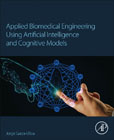
Applied Biomedical Engineering Using Artificial Intelligence and Cognitive Models
Garza Ulloa, Jorge
Applied Biomedical Engineering Using Artificial Intelligence and Cognitive Models focuses on the relationship between three different multidisciplinary branches of engineering: Biomedical Engineering, Cognitive Science and Computer Science through Artificial Intelligence models. These models will be used to study how the nervous system and musculoskeletal system obey movement orders from the brain, as well as the mental processes of the information during cognition when injuries and neurologic diseases are present in the human body. The interaction between these three areas are studied in this book with the objective of obtaining AI models on injuries and neurologic diseases of the human body, studying diseases of the brain, spine and the nerves that connect them with the musculoskeletal system. There are more than 600 diseases of the nervous system, including brain tumors, epilepsy, Parkinson's disease, stroke and many others. These diseases affect the human cognitive system that sends orders from the central nervous system (CNS) through the peripheral nervous systems (PNS) to do tasks using the musculoskeletal system. These actions can be detected by many Bioinstruments (Biomedical Instruments) and cognitive device data, allowing us to apply AI using Machine Learning-Deep Learning-Cognitive Computing models through algorithms to analyze, detect, classify, and forecast the process of various illnesses and injuries of the human body. Applied Biomedical Engineering Using Artificial Intelligence and Cognitive Models provides readers with the study of injuries and neurological diseases of the human body through Artificial Intelligence using ML-DL-CC models based on algorithms developed with MATLAB® and IBM Watson®. Provides an introduction to Cognitive science, cognitive computing and human cognitive relation to help in the solution of AI Biomedical engineering problemsExplains the functions and applications of different Biomedical instruments to obtain data, cognitive data and medical imaging techniques of the system under studyIncludes coverage of the evolution Artificial Intelligence through Machine Learning (ML), Deep Learning (DL) and AIbased commercial products cloud services as: IBM (Cognitive Computing, IBM Watson®, IBM Watson Studio®), Google (AI Experiments), Microsoft Azure (AI platform and Intelligent Applications), Intel (Intel's AI strategy), and Amazon (Amazon Web Services)Provides the necessary tools to accelerate obtaining results for the analysis of injuries and neurologic diseases that can be detected through the static, kinetics and kinematics, and natural body language data and medical imaging techniques applying AI using ML-DL-CC algorithms with the objective of obtaining appropriate conclusions to create solutions that improve the quality of life of patients INDICE: 1. Biomedical Engineering and the evolution of Artificial Intelligence 2. Introduction to Cognitive science, cognitive computing and human cognitive relation to help in the solution of AI Biomedical engineering problems 3. Artificial Intelligence models applied to Biomedical Engineering 4. Machine learning models applied to Biomedical Engineering 5. Deep learning models applied to Biomedical Engineering 6. Cognitive Computing models applied to Biomedical Engineering 7. C AI-ML-DL-CC models applied to Biomedical Engineering
- ISBN: 978-0-12-820718-5
- Editorial: Academic Press
- Encuadernacion: Rústica
- Páginas: 332
- Fecha Publicación: 01/08/2021
- Nº Volúmenes: 1
- Idioma: Inglés
